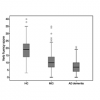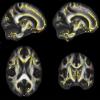14 March 2018
Exploring the Role of Cognitive Factors in a New Instrument for Elders' Financial Capacity Assessment
Although the general public and mental health professionals seem to disregard incapacity regarding financial issues and relevant decision making in mild cognitive impairment (MCI), and focus only on severe dementia cases, a PhD study in Greece reveals that noticeable deficits do exist in the handling of financial issues in elders suffering from MCI.
12 March 2018
The Role of Verb Fluency in the Detection of Early Cognitive Impairment in Alzheimer's Disease
The ability to generate spoken verbs in infinitive in a given time begins to worsen in the early stages of Alzheimer's disease (AD). Thus, the verb fluency test has been found to be a suitable neuropsychological tool for the detection of healthy aging people at risk of developing cognitive impairment, according to a recent research of the Research Center and Memory Clinic, Fundació ACE, Institut Català de Neurociències Aplicades, UIC-Barcelona, Spain.
7 March 2018
Fipronil and other pyrazole insecticides induce Amyloid-β42 production
A new study led by Laurent Meijer of ManRos Therapeutics shows that some pyrazole insecticides, of which fipronil is an archetype, trigger enhanced in vitro production of Aβ42/Aβ43 over Aβ40 amyloid peptides in a cell-free, highly purified preparation of γ-secretase, in various cell lines and in neurons differentiated from human-induced pluripotent stem cells (iPSCs) from a healthy or a familial Alzheimer's disease (AD) patient with the APP K724N mutation.
21 February 2018
Data Detectives Shift Suspicions in Alzheimer's from Usual Suspect to Inside Villain
The mass pursuit of a conspicuous suspect in Alzheimer’s disease may have encumbered research success for decades. Now, a new data analysis that has untangled evidence amassed in years of Alzheimer’s studies encourages researchers to refocus their investigations.
20 February 2018
e-Health can support healthy ageing and help preventing cardiovascular disease and dementia in elderly people
An innovative e-Health solution, based on an interactive Internet platform, has been developed to support senior citizens in improving their lifestyle to prevent cardiovascular disease, cognitive decline and dementia. Researchers from the HATICE trial presented the solution in a pre-press article published in Journal of Alzheimer's Disease 62(2).
15 February 2018
Poor fitness linked to weaker brain fiber, higher dementia risk
Scientists have more evidence that exercise improves brain health and could be a lifesaving ingredient that prevents Alzheimer’s disease. In particular, a new study from UT Southwestern’s O’Donnell Brain Institute suggests that the lower the fitness level, the faster the deterioration of vital nerve fibers in the brain. This deterioration results in cognitive decline, including memory issues characteristic of dementia patients.
8 February 2018
Alzheimer's disease: dual mechanism of actions of overactive and cytosolic BRCA1 in neuronal death
A new study suggests a dual mechanism of actions of overactive and cytosolic re-localized BRCA1, the major guardian of genomic stability, in neurons death by aberrant DNA damage response and presenilin 1 dysfunction in Alzheimer's disease.
6 February 2018
One in five older adults experience brain network weakening following knee replacement surgery
A new University of Florida study finds that 23 percent of adults age 60 and older who underwent a total knee replacement experienced a decline in activity in at least one region of the brain responsible for specific cognitive functions. Fifteen percent of patients declined across all brain networks the team evaluated.
6 February 2018
Immune system dysfunction may occur early in Alzheimer's disease
An association between inflammation biomarkers in both blood plasma and cerebrospinal fluid and markers of Alzheimer's disease (AD) associated pathology, has been found by researchers at the University of Colorado Anschutz Medical Campus working with the University of Wisconsin Alzheimer's Disease Research Center and the University of California San Francisco Memory and Aging Center. The discovery sheds new light on the pathology of AD as well as on the communication between the brain and the rest of the body.
30 January 2018
Ohio State Study of Brain Pacemaker Shows Promise in Slowing Decline of Alzheimer's
While most treatments for Alzheimer's disease focus on improving memory, researchers at The Ohio State University Wexner Medical Center conducted a study aimed at slowing the decline of problem solving and decision-making skills in these patients. Thin electrical wires were surgically implanted into the frontal lobes of the brains of patients with Alzheimer's disease to determine if using a brain pacemaker could improve cognitive, behavioral, and functional abilities in patients with this form of dementia.
















